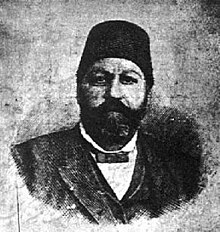Mirza Habib Esfahani
Mirza Habib Esfahani | |
|---|---|
 Picture of Mirza Habib Esfahani | |
| Born | 1835 Ben, Qajar Iran |
| Died | 1893 (aged 57–58) Bursa, Ottoman Empire |
| Resting place | Bursa |
| Occupation | Poet, grammarian and translator |
| Language | |
| Notable works | Dastur-e Sokhan Khatt va khattatan |
Mirza Habib Esfahani (
Biography
He was born in 1835 in Ben, a small village in the Bakhtiyari area of western Iran. He started his education in Saman, and completed his traditional secular and religious education in Isfahan and Tehran. In 1862, he went to Baghdad to study literature, Arabic, and Islamic studies.[1][2] In 1866, he returned to Tehran, but soon found himself forced to leave.[2] According to the Danish historian Claus Valling Pedersen, it was due to the "contents of some of his writings had led secular and religious authorities, respectively, to accuse him of anti-state and anti-religious activities."[1] However, the Turkish historian Tahsin Yazıcı states it was "apparently on account of a poem in which he satirized Mirza Mohammad Khan Sepahsalar and which earned him accusations of heresy." Mirza Habib fled to Istanbul in the Ottoman Empire, where he at first sought safety in a French monastery. He quickly established connections with influential political and literary personalities such as the grand vizier Mehmed Emin Âli Pasha and Ahmed Vefik Pasha, who translated the writings of the French playwright Molière into Ottoman Turkish.[2]
Mirza Habib was able to work as a Persian and Arabic lecturer at the
Mirza Habib sought medical care in Bursa near the end of his life, where he died in 1893 and was buried.[1]
Works
Mirza Habib was a creative and flexible translator who wrote in both Persian and Turkish. In particular, he is praised for his Dastur-e Sokhan ("The grammar of speech"), the first systematic grammar of the Persian language.[1][2] It was first released in Istanbul in 1872, and many later works have used it as inspiration.[2]
Mirza Habib's most significant book in Turkish is the Khatt va khattatan that he composed in 1888, which is a biographical compendium of Persian and Turkish calligraphers.[2]
References
- ^ a b c d e Pedersen 2021.
- ^ a b c d e f g h Yazıcı 2002.
- ^ Dabashi 2015, p. 163.
- ^ Dabashi 2015, p. 166.
Sources
- ISBN 978-0674504691.
- ISBN 978-1108488129.
- Pedersen, Claus Valling (2021). "Mīrzā Ḥabīb Iṣfahānī". In Fleet, Kate; ISSN 1873-9830.
- Yazıcı, Tahsin (2002). "Ḥabib Eṣfahāni". Encyclopaedia Iranica.
Further reading
- Miransari, Ali (2018). "حبیب اصفهانی، میرزا". The Great Islamic Encyclopaedia (in Persian).
